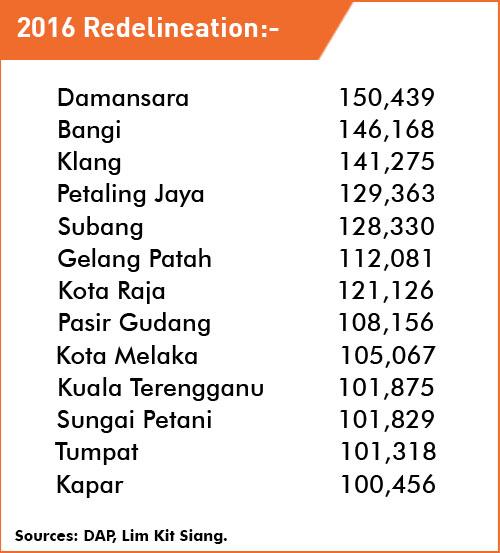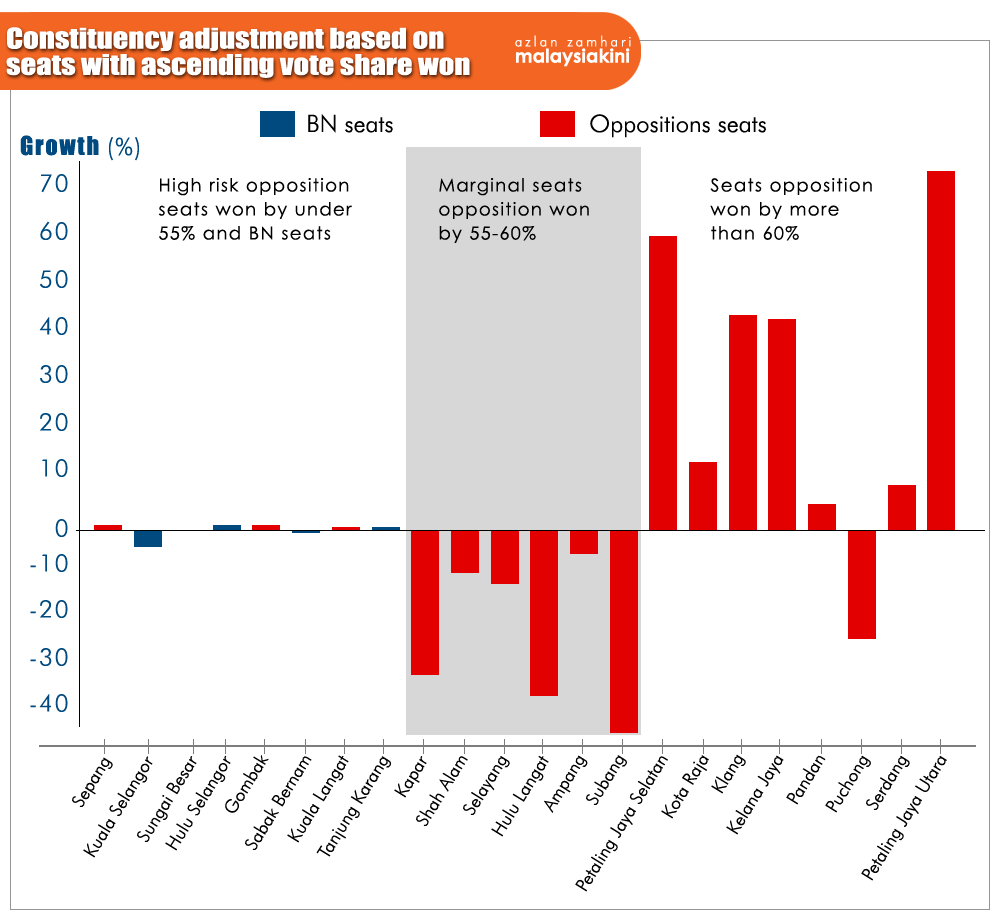Proposed boundary changes will see the bundling of non-BN voters into a handful of extra large “super constituencies”, paving the way for a BN victory, said DAP.
Selangor DAP chief Tony Pua said the move is evident, given expectations that BN is likely to win an even smaller vote share compared to the 48 percent popular votes it won to take the polls in 2013.
“Hence the trump card for BN was to redraw the election constituency boundaries to the extent that BN will be assured of a thumping victory even if their popular votes continue to decline.
“The simplest way of doing so would be to bundle opposition inclined voters into super-constituencies with more than 100,000 voters while breaking up hard-core pro-ruling party supporters into smaller multiple constituencies,” he said in a statement.
The clearest example, he said, is in his own constituency of Petaling Jaya Utara where new boundaries mean the number of voters ballooned by a whopping 76 percent, from 85,401 to 150,439 voters.
He said based on DAP's analysis, Damansara could be won with a super-majority of 73,533, while neighbouring Subang (renamed Sungai Buloh) becomes a marginal seat.
If PKR won the seat with a majority of 26,719 in 2013, the projected majority for the now Sungai Buloh seat is a “very marginal” 3,037 votes, he said.
 He added that based on 2013 voting patterns, BN will win at least seven Selangor assembly seats - Sabak, Hulu Kelang, Sementa, Selat Kelang, Pelabuhan Kelang, Sijangkang and Morib.
He added that based on 2013 voting patterns, BN will win at least seven Selangor assembly seats - Sabak, Hulu Kelang, Sementa, Selat Kelang, Pelabuhan Kelang, Sijangkang and Morib.
The seats are now held by PAS, Amanah, PKR and Independent assemblypersons.
“With brazen gerrymandering coupled with an aggressive campaign based on race and religious rhetoric, there is now a very real possibility that Selangor will indeed fall to BN,” he said.
“The DAP Selangor state committee will meet later today to discuss the findings of our studies and formulate our position as well as the next steps which we need to take to ensure that the people of Selangor will not be robbed of their mandate in the next general elections,” he said.
 Yesterday, Selangor Menteri Besar Azmin Ali rejected DAP veteran Lim Kit Siang’s proposal to call snap polls in view of the redelineation proposal.
Yesterday, Selangor Menteri Besar Azmin Ali rejected DAP veteran Lim Kit Siang’s proposal to call snap polls in view of the redelineation proposal.
Azmin said the Selangor government will fulfill the people’s mandate, by serving the full term.
Pattern in boundary changes
Malaysiakini’s analysis of the proposed boundary changes has found that parliamentary seats in Selangor that were won by the opposition by more than 60 percent of the votes cast, with the exception of Puchong, were all enlarged.
However, all marginal seats won by the opposition with a vote share of between 55 percent and 60 percent were shrunk.
As for high risk opposition seats that were won by less than 55 percent and BN seats, the size were largely unchanged.
Seats with substantial increases in voter size are Petaling Jaya Utara (+76.2 percent), Petaling Jaya Selatan (+62.6 percent), Klang (+45.5 percent), Kelana Jaya (+45.0) and Kota Raja (+14 percent), all of which the opposition won by over 60 percent in the 13th general election.
The only exception was Puchong, which shrunk by 22.7 percent.
Subang (-42.9 percent), Hulu Langat (-34.9 percent), Kapar (-30.3 percent) and Selayang (-11.4 percent) were among the seats that shrank, which the opposition won by 55 to 60 percent of the votes cast in the last general election.
It should be noted that the planned significant change in the size of parliamentary seats in Selangor is in stark contrast with that for the other states, which at most will see an adjustment of around 10 percent for any particular parliamentary seat.
‘Why depart from predecessor’s plan?’
Meanwhile, Lim questioned why the Election Commission (EC) chief Mohd Hashim Abdullah had departed from his predecessor’s redelineation plan of ensuring that there will be no super-size parliamentary constituencies.
Lim reminded that Mohd Hashim’s predecessor, Abdul Aziz Mohd Yusof, had said that in the new redelineation to be proposed by the EC, “a constituency with a large number of votes, more than 100,000, has to be divided into two, so that the constituents could obtain good service from the elected representatives”.
“Why did Mohd Hashim abandon this important constitutional and democratic principle in the final proposal of the Election Commission for the redelineation of electoral constituencies?” Lim asked in a statement today.
He also pointed out that the proposed redelineation is “downright unconstitutional” as it violates the principle laid down in the Thirteenth Schedule of the constitution.
The Thirteenth Schedule stipulates that in any constituency redelineation, “the number of electors within each constituency in a state ought to be approximately equal except that, having regard to the greater difficulty of reaching electors in the country districts and the other disadvantages facing rural constituencies, a measure of weightage for area ought to be given to such constituencies”.
Lim said as such, the Thirteenth Schedule provides for weightage for rural areas, but the voter disparity for urban-rural constituencies should be closed and not widened, as is the case with the proposed redelineation.
“Why is the Election Commission widening instead of narrowing the voter disparity in the state constituencies in Selangor, if there is no ulterior agenda to redelineate the electoral constituencies to benefit Umno?” he questioned.
READ: Your Kiniguide to the redelineation exercise.

